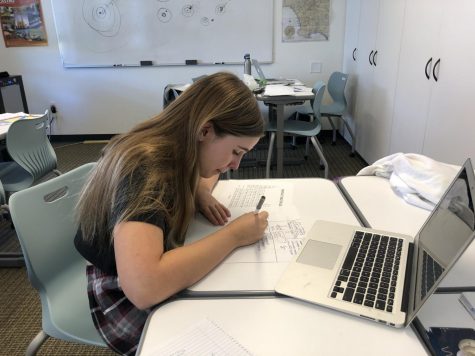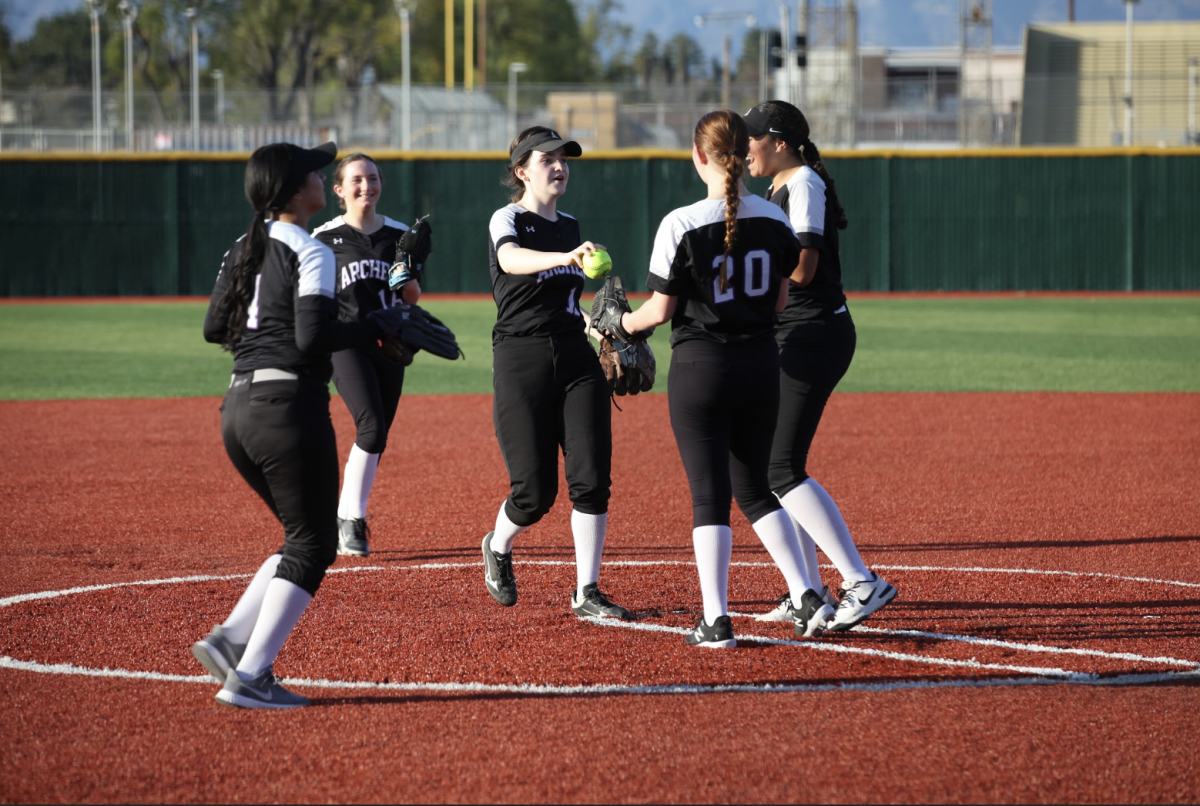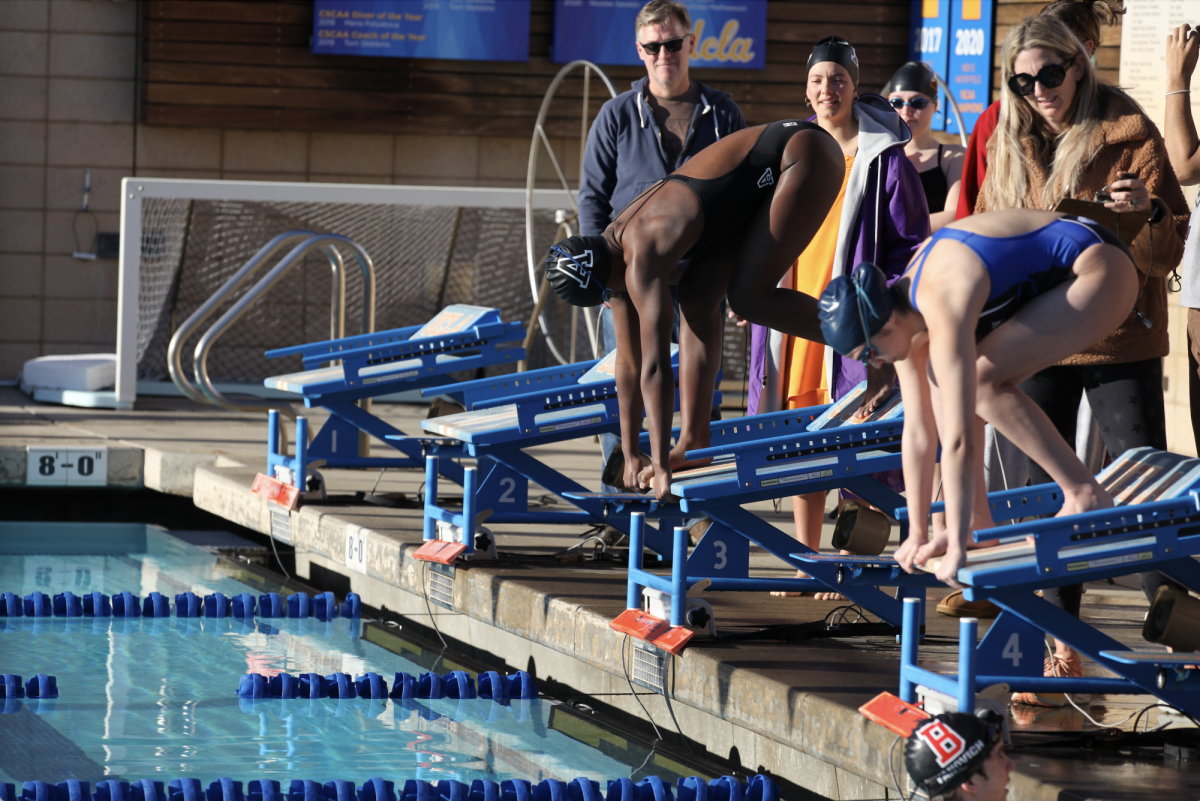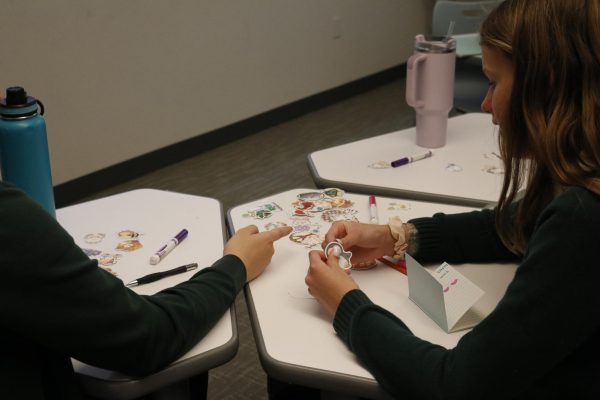‘Every kid is more than a number’: Educators, students express perspectives on grading systems
Photo credit: Nyah Fernandez
Tenth grade students Chidimma Nwafor, Alexa Marsh and Andrea Ramirez study for a chemistry final. They are helping each other through practice problems from their chemistry packets.
June 7, 2020
After a seven hour school day and a two hour cross country or track pratice, sophomore Chidimma Nwafor arrives home and begins her homework. Nwafor estimates she spends four hours on homework per night. This student-athlete maintains balance with her homework and practice with strategic management which ensures that she has enough time to do both. Nwafor feels that attaining good grades at school has impacted her motivation in many ways. One way that grades have impacted her motivation is how she works to attain her goals.
“My parents have provided so much for me in my life, it motivates me more to work hard for my family and I as well,” Nwafor said.
Students and teachers explain the positive and negative side towards grades. Each student has a different perspective of how grades impact their life; the one similarity that they have in common was how grades can cause stress and motivation simultaneously. Some topics that are focused on are how students view online learning due to COVID-19, the grading culture at different schools around the Los Angeles district and the grading culture at Archer.
In an article written by Ashley-Lam Sinclair, a high school instructional coach, 2016 Kentucky Teacher of the Year and the founder and CEO of Curio Learning, “Why Grades Are Not Paramount to Achievement,” she explains that during the beginning of the school year, she decided not to give her sophomores any grades for six weeks.
Sinclair believes that students had a positive attitude and “were freed from the pressure” of grades when they were absent. Similarly, she believes that grades negatively impacted students’ mental and emotional health. When grades were not present, students focused on “learn[ing], engagement, enthusiasm, motivation and determination.”
Due to the pandemic of COVID-19, students are required to take online zoom classes to make sure they are not falling behind. Archer has decided for students’ grades to not go down due to the circumstances that we are in.
According to Upper School Director Gretchen Warner, Archer has implemented the guidelines for grading that support the students’ growth without hurting the them for the circumstances that are out of their control.
“I imagine students are appreciative of this, and recognize that we are all cognizant of the extraordinary nature of this spring,” Warner wrote.
Nwafor feels a sense of relief to not stress about grades going down. She feels more “lenient” with herself more with the classes she is taking.
“I do love the fact that grades can not go down,” Nwafor said. “It is not like all our progress of our grades will be stolen, which is something I really enjoy.”
Warner feels that the Archer teachers have done “extraordinary” work in order to quickly and effectively transfer their classes to a remote learning environment.
“Teachers and students alike have all been calibrating and recalibrating the time spent on Zoom to maximize collaboration, connectivity and creative thinking in the pursuit of the mastery objectives in each class,” Warner said.
Warner describes that students have reported that online school is moving at a great pace and that they are connecting with their family and friends in new and authentic ways.
“Some students report that they have come to love the remote learning environment because the pace seems slower and they are able to choose when to get their work done,” Warner wrote.
In addition, Nwafor feels that there are some positive sides of being online during this pandemic.
“Due to the fact that my grades can’t go down, I feel less pressure and it allows me to export different areas whether it be a creative outlet or finding a new hobby,” Nwafor said.
Warner feels that some students do “over-think” grades, while others do not. She feels that some students “over-do school” meaning they spend more time and effort than they need to earn the grade they want.
“I hope that students will use this spring as an opportunity to test their capacity and see if they can be successful (by their definition, not mine or anyone else’s) without studying or preparing for many hours for assessments or assignments,” Warner wrote.
Sophomore Terence Brown who attends Crenshaw High School and sophomore Jeremiah Johnson who attends View Park High School share their own perspective of the grading culture at their schools. Both students see grades as an important factor in their lives.
Johnson, a longtime rugby, baseball, basketball and football player, has experienced the difficulty of trying to balance grades with his athletics.
“As a student-athlete, I find grades highly important,” Johnson said. “If I do happen to take athletics to the higher level, and if my grades happen to fall below any average, they will take my scholarship away and I will have no backup for school, and I would be left with nothing.”
Johnson believes that education creates a “foundation” for any sport. While athletic ability is important, he believes one must be educated in order to have a successful life. Johnson said that grades have both positive and negative impact on one’s mindset towards life.
“I think it can go both ways — it can be positive because grades make you want to work harder and you can see the outcome of working hard,” Johnson said. “I also feel like it is a negative thing to some people because people stress too much about that one grade rather than how they are doing in the class and if they are learning.”
At Johnson’s school, grades determine if students are eligible to participate in sports, clubs or the national honor society
“On our transcripts that we receive at the end of the year, it will say if you are above the scale or you are below the standard for a college that you would want to go to and will let us know if we need to fix anything,” Johnson said.
Brown feels that grades can have a “positive” and “negative” impact on students because they affect college choices. Brown said that Crenshaw High school offers honors and APs. Certain teachers will offer retakes on certain assessments and finds his honors classes more of “an extra credit.”
“I don’t necessarily find them hard or difficult, there are some APs and Honors classes at my school that really do the same thing that the regular classes do,” Brown said.
Archer junior Nadia Charles views grades as a “big deal,” and she wishes that Archer would have A+ grading system. To achieve an A+ one must get a 97-100 percent.
“At Archer, if we have 98 percent in the class, it is only an A and I feel like if I work so hard to get that ninety-eight percent in the class I deserve to see that plus sign on it,” Charles said. “For me, it just really does something for my soul.”
Charles feels that grades can be a factor in how you see yourself at school. She also feels that the grades students receive reflect if there is an area of growth for a student or if one needs to ask for help.
“I think grades are important because it lets you know where you are — if you have a B+ in a class that can either be good or bad for you considering how you view grades,” Charles said. “Grades let you know where you are at, where you can improve.”
Nwafor feels that grades are a very important factor in her life. She believes that grades can define who you are and how much work you put in during that extra free time you have.
“Being in this environment, I personally feel like grades are such a big factor when applying for college, and there is a lot of pressure with grades in general,” Nwafor said.
Nwafor she feels that being a student athlete comes a lot with challenges of managing your school work, social life, and making sure you show up to practices and games. She also feels that in order to succeed in school or in life you have to work hard to play hard. She finds that being a student always comes first before being an athlete.
“I feel like with being a student-athlete you still need to remember student goes first,” Nwafor said. “You have to get your good grades and remember that you will have the advantage over others to be able to say that I had good grades and still maintained being an athlete.”

Nwafor feels that there are negative sides to grades such as making sacrifices to attain good grades and putting in extra effort.
“The negative side of grades is there was always a period of stress and staying up to study to make flashcards, not sleeping, getting home late,” Nwafor said. “Then the positive moments of grades is when all of that hard work pays off.”
English teacher Kathleen Bergen feels that not receiving those good grades at school puts harm on how you view yourself at school and outside of school. She believes that students start to view grades differently if they do not get that perfect score.
“I am concerned about how students view grades here, and anything less than an A is failing and that is very distressing to me,” Bergen said.
Bergen feels that grades overpower students and how they view themselves at school or in general.
“I feel like students define and identify themselves with their grades and the grades they receive,” Bergen said. “Every kid is more than a number, and a number should never define who you are.”
Bergen understands that this generation has a lot more “pressure,” in terms of their grades and how their grades impact what schools they get into.
“I do think that there is an important message that need to be shared to students, [which is] you are greater than the sum of your parts,” she said. “I think focusing too much on grades is creating undue stress, unnecessary anxiety and a lot of self loathing,”




![Freshman Milan Earl and sophomore Lucy Kaplan sit with their grandparents at Archer’s annual Grandparents and Special Friends Day Friday, March 15. The event took place over three 75-minute sessions. “[I hope my grandparents] gain an understanding about what I do, Kaplan said, because I know they ask a lot of questions and can sort of see what I do in school and what the experience is like to be here.](https://archeroracle.org/wp-content/uploads/2024/03/grandparents-day-option-2-1200x800.jpg)





























































